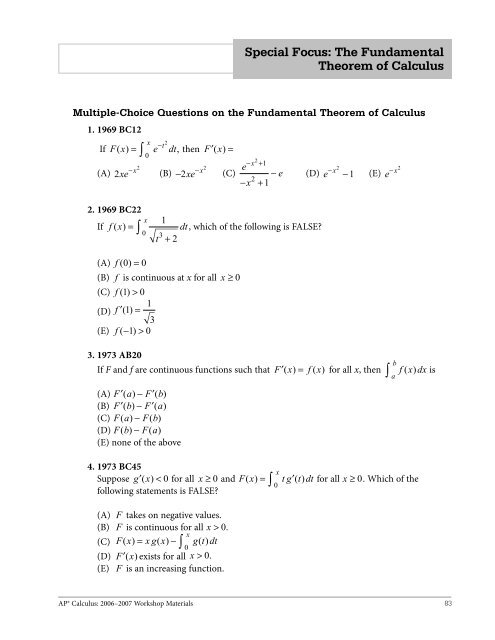AP Calculus
Calculus_SF_Theorem
Calculus_SF_Theorem
You also want an ePaper? Increase the reach of your titles
YUMPU automatically turns print PDFs into web optimized ePapers that Google loves.
Special Focus: The Fundamental<br />
Theorem of <strong>Calculus</strong><br />
Multiple-Choice Questions on the Fundamental Theorem of <strong>Calculus</strong><br />
1. 1969 BC12<br />
∫<br />
x<br />
0<br />
−t<br />
2<br />
If F( x) = e dt,<br />
then F′ ( x)<br />
=<br />
(A) 2xe − x2 (B)<br />
−<br />
−2xe x (C) e e<br />
− x + − 2<br />
1<br />
2<br />
2 1<br />
− x +<br />
(D) e −x<br />
2<br />
−<br />
1 (E) e −x<br />
2<br />
2. 1969 BC22<br />
If f ( x) =<br />
∫<br />
x<br />
0<br />
1<br />
dt, which of the following is FALSE?<br />
3<br />
t + 2<br />
(A) f ( 0)<br />
= 0<br />
(B) f is continuous at x for all x ≥ 0<br />
(C) f ( 1)<br />
> 0<br />
(D) f ′( 1)<br />
=<br />
1<br />
3<br />
1 0<br />
(E) f ( − ) ><br />
3. 1973 AB20<br />
b<br />
If F and f are continuous functions such that F′ ( x) = f ( x) for all x, then ∫ f ( x)<br />
dx is<br />
(A) F′ ( a) − F′<br />
( b)<br />
(B) F′ ( b) − F′<br />
( a)<br />
(C) F( a) − F( b)<br />
(D) F( b) − F( a)<br />
(E) none of the above<br />
a<br />
4. 1973 BC45<br />
x<br />
Suppose g′ ( x) < 0 for all x ≥ 0 and F( x) = ∫ t g′<br />
( t)<br />
dt<br />
0<br />
following statements is FALSE?<br />
for all x ≥ 0. Which of the<br />
(A) F takes on negative values.<br />
(B) F is continuous for all x > 0.<br />
x<br />
(C) F( x) = x g( x) − ∫ g( t)<br />
dt 0<br />
(D) F′<br />
( x) exists for all x > 0.<br />
(E) F is an increasing function.<br />
<strong>AP</strong>® <strong>Calculus</strong>: 2006–2007 Workshop Materials 83


